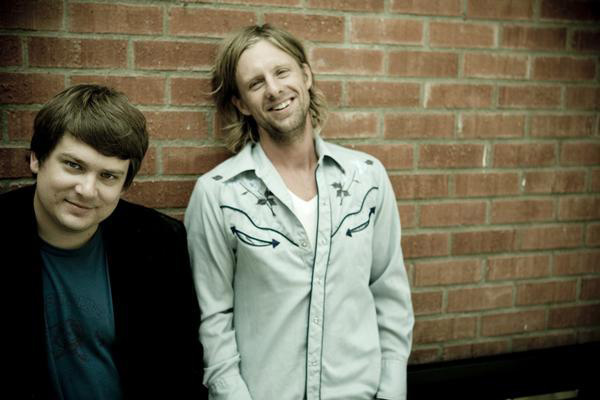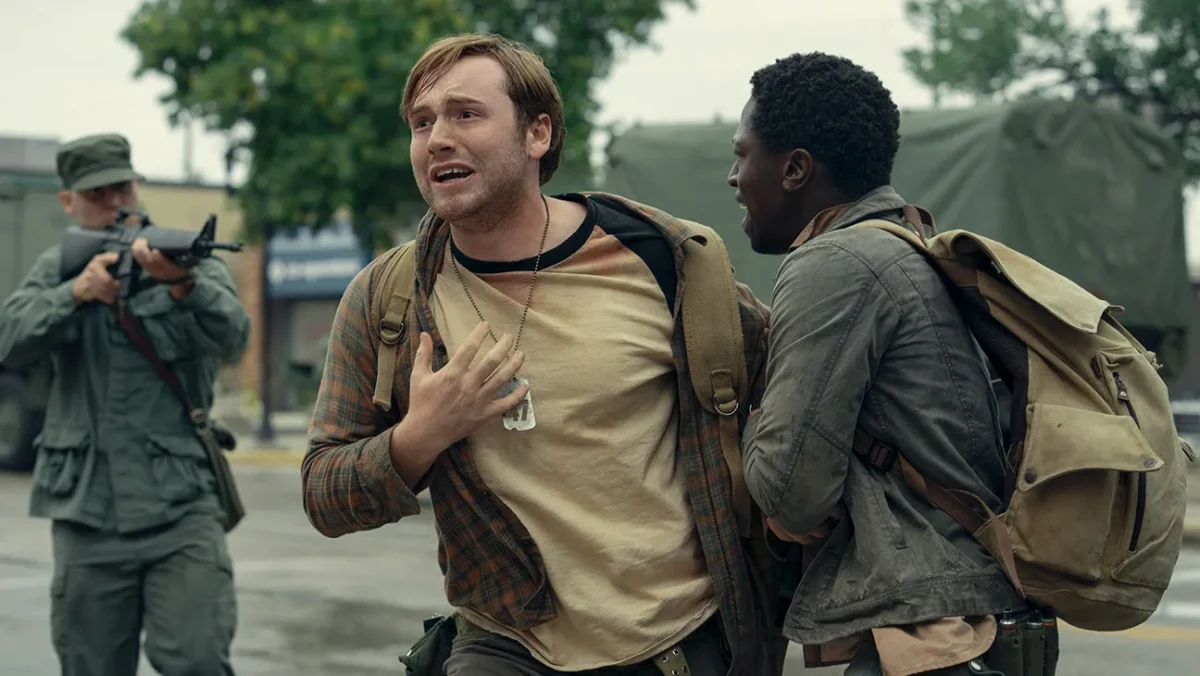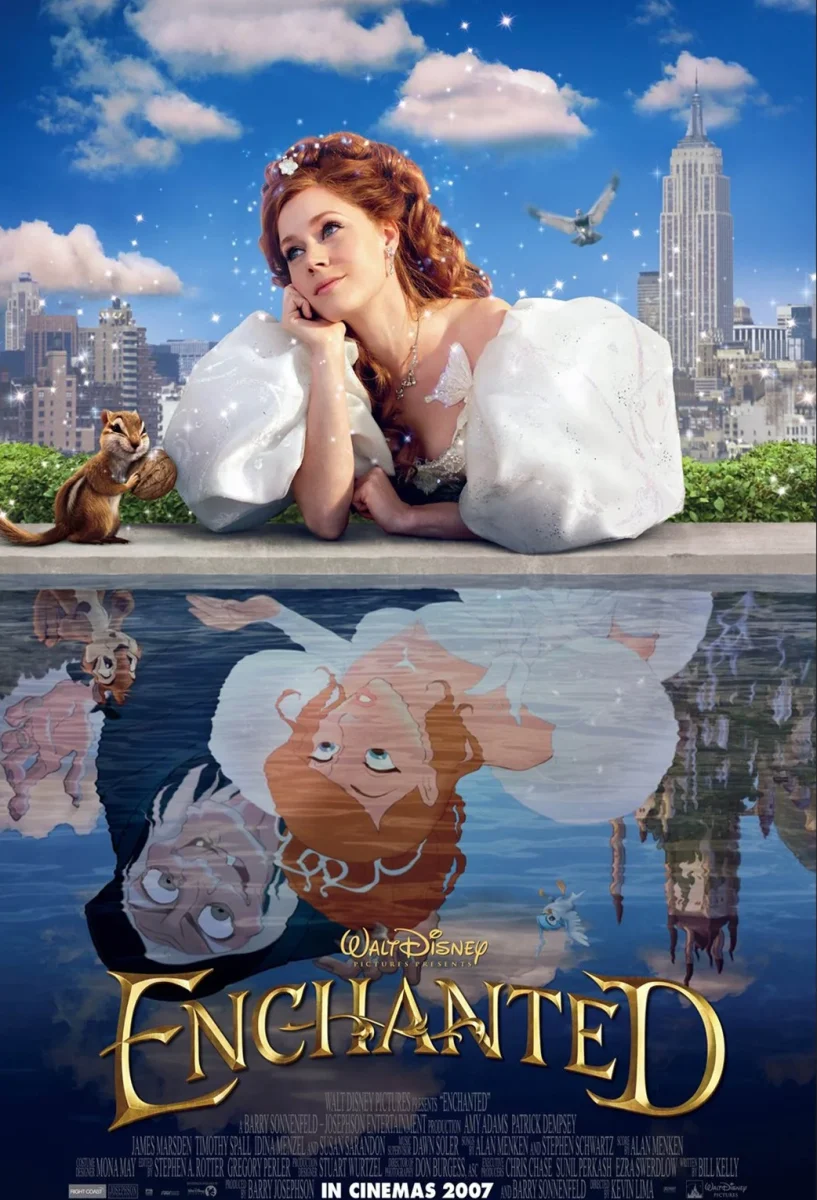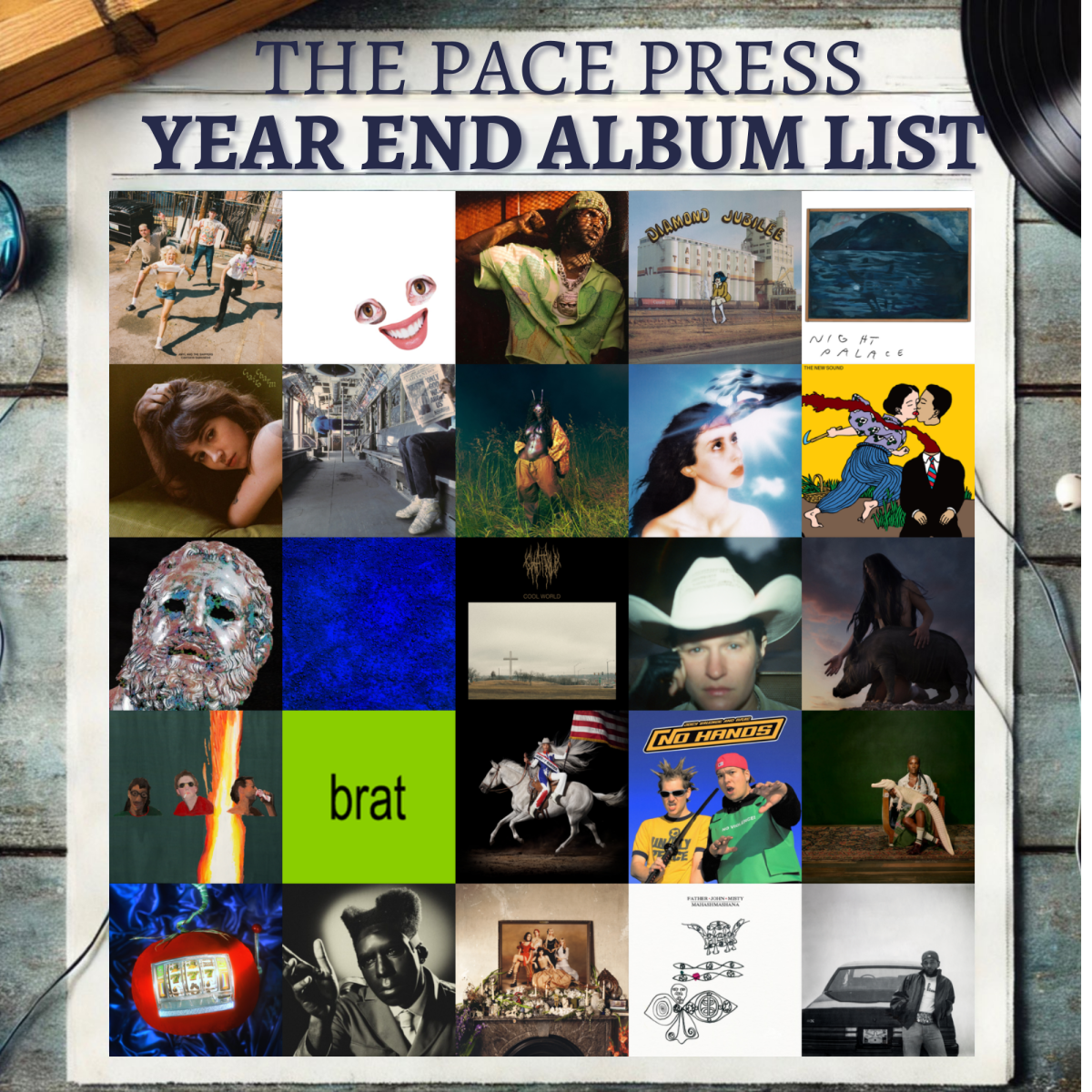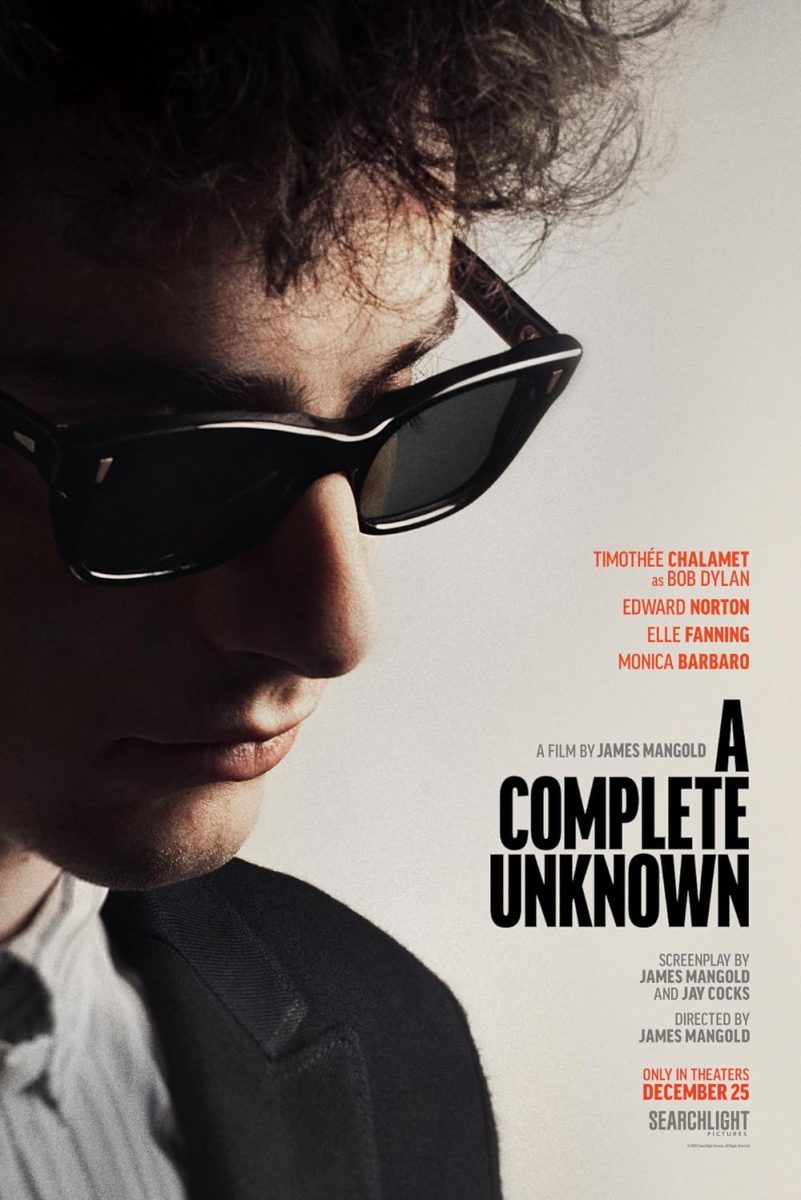Jon Foreman of alternative rock band Switchfoot, and Sean Watkins of folk/bluegrass band Nickel Creek have come quite a way since releasing their fortuitous first full-length self-titled album, Fiction Family in 2009. Just a few short months ago they celebrated the successful launch of their second album, Fiction Family Reunion.
Recorded over the span of two years, the latest album shows immense growth, with the biggest difference being the official new band members, bassist Tyler Chester and drummer Aaron Redfield, expanding the folk family and giving the album a fuller sound. Original members Foreman and Watkins recently took some time out of their busy tour schedules to chat with The Pace Press about their musical journeys both inside and outside of Fiction Family.
The Pace Press: So how did you and Jon decide to form the band and pursue this project together?
Sean Watkins: We live near each other in North San Diego, and I grew up there and lived for seven years in the neighboring town from Jon’s. We were aware of each other’s bands, being local bands, but we never met each other until we played a show in downtown San Diego, called the Street Scene. We were playing opposite each other in the same area. I went back and thought, “this is stupid that I don’t know these guys and we live so close together!” So I found their dressing room, and we chatted and traded numbers and said, “hey we should write songs and hang out.” And usually you do that and nothing ever happens, but we ended up running into each other at a coffee shop that we both go to all the time a month or so later and ended up both taking some time off and started writing songs together and thought we’d make an EP. Then we had seven songs, and then we thought oh, why don’t we just make it 10 songs and make it a record. So, it just kind of evolved over time into something that we wanted to put out into the world.
TPP: How did you manage to record two albums with commitments to other bands and touring?
SW: The first one was very much kind of an accident almost—we just started recording songs we’d been writing and then after a while we had enough to make a record. It was probably close to a year and a half or so—it was a while—when we were home and both off. We did a lot of emailing of songs back and forth and then we finished it and had the record done, and we gave it to Jon’s management, Red Light. They gave it to a couple record companies and one wanted to put it out. And so we thought, this is cool, let’s block off a month or two and play some shows. The second was about two and a half years, so we just recorded it till we had enough songs and found a time slot in between tours. We try to play as much as we can, but it’s tough.
Jon Foreman: You figure out how to do the things you love. I’m really fortunate to have a job that I love, both in Fiction Family and Switchfoot and playing solo music. I feel like all three of them are different outlets that allow me to say different things and I appreciate all three for different reasons. And so the element of balancing is just a matter of trying to make sure that nothing gets in the way of the other.
TPP: When did you pick up other members Tyler Chester and Aaron Redfield?
SW: When Jon and I made the first record it was just he and I on the tracks for the most part. My sister was on a couple—she played violin on a couple—but when it came time to tour we needed some people to help play other parts. So, Aaron is a drummer that plays with Jon a lot when he does solo things, and Aaron suggested we get Tyler to play bass and other keyboards and other things. So, we sort of hired them as our band to come out on tour in early ‘09 and the record came out and it quickly became apparent that this was a four piece band—we loved it so much, and loved each other so much we just kind of assimilated them into the band and now it’s the four of us, and any less than the four of us and it’s not Fiction Family.
TPP: How do you know when a song is “done”?
SW: It’s hard to know. A lot of times the writing process is illusive. A lot of times with Jon he’ll have a record and write a song down and he’ll send me a mp3 of it and sometimes I’ll have something done and play it for the guys and sometimes there’s comments made and sometimes I’ll say, “that’s great the song is done, we just have to record it.” You just have to be sensitive to each other and not be afraid to speak your mind. It’s a delicate thing sometimes, but things are really good between us and we know when a song is done. And if it isn’t done, sometimes we just let it sit for a while and come back to it and have some ideas. And sometimes the song is too done—you’ve added too much to it, and you need to take something away. It’s tough. I think you just have to trust each other’s judgment. It’s all about communication and trusting each other.
JF: [laughs] That’s probably the hardest question you’ve asked! I don’t know that you ever know when it’s done, you just kind of stop. You can be done with a lyric, you can be done with a melody but when you’re recording, especially now days, you can always add something more onto it. You can also make horrible mistakes trying to make something better. Sometimes you’ve got to put the paintbrush down and step away from the canvas, just walk away.
TPP: What are the biggest influencing artists for Fiction Family?
SW: It’s hard to say. We’re just kind of who we are individually. We’re influenced by a lot of people individually and that’s determined who we are as a band. It’s hard to say as a band collectively what we’re influenced by. We try to make music that makes sense and meet each other in the middle.
TPP: So you guys feel like you have a sense of freedom with your music and expressing yourselves?
SW: Yeah, totally. It’s not the main thing we do and not our main source of income. So we’re sort of just free to do whatever we want who we are—not that you can’t be who you are and be a big band—but for us the stakes are a little bit lower with this not being our main project. So we can really just have fun with it and not worry about selling a ton of records.
TPP: Have you ever thought of touring Fiction Family exclusively and more extensively after the success with Heavy and Light tour?
SW: Yeah, it’s been really great. The heavy and light tour was kind of the only real touring we did for this, and that was with a lot of other people and it was a really fun tour. I hope we can do a tour at some point that’s just us, sort of a headlining tour where we can play more. We played maybe a half hour every night [at the Heavy and Light tour]. But the response was really good and people seem to like the new music and everything seems great.
JF: Yeah, Sean, Aaron and Tyler have different musical projects so Fiction Family is kind of what we do whenever it works out in everyone’s schedule. Hopefully it wont be too long before we get back together for another tour.
TPP: Jon—there’s been a few Switchfoot shows here in NYC, and the energy is always really amazing. How did you become such a good performer—were you always comfortable on stage? Are you ever hard on yourself when you make a mistake?
JF: You know, that’s a great question. When I first started making music I hated being on stage, because I’m not driven to play music to be in front of people. I just love music and love the songs and the spotlight felt really uncomfortable. In fact, that’s one of the reasons I like going into the crowd—because it feels more comfortable being off stage than on stage. So over the first few years of playing music I realized that, at first you think: there’s wrong notes, there’s chaos, strings break, guitars go out of tune, what happens—it’s not the way I want it, it’s not the way I planned it, it’s not the way I spent all my time recording it. But over the years I’ve kind of learned to embrace the chaos and recognize that that’s a beautiful part of music. Live music is chaos. It’s finding the harmony within the chaos, and for me that became what I enjoyed about live music.
TPP: How would you say this album different from the first Fiction Family album?
JF: That’s a good question. The first Fiction Family record was primarily Sean and I on off time just working in our respective home studios, which consists of a couple microphones and a couple guitars and we’d play whenever we got a chance. And realistically, there’s no pressure on it, no thought of, “oh this has to come out.” It’s just, this is just for fun, two friends working on music for fun. We toured that first one and we ended up touring with Aaron and Tyler, drummer and bass player, and joined forces with and ended up thinking this is so special this particular concoction of musicians that we’ve found, we’ve gotta make another record. And so the second record is much more of a band, and a lot of the songs—most of the songs—were recorded all in one room together one take, vocals included; so you can hear the drums in the vocal mic, the vocals in the drum mic, and it’s all just one sound. It’s just basically a live band. We really wanted to capture that magic that you feel live.
TPP: Is there a level of recognition or fame you can get these days while still maintaining an honest identity? Fiction Family’s music is very transparent, but I don’t know that it’s possible for everyone to achieve the same level of success that way the way you have with while being as straightforward and honest with music and performing. It seems more likely that you have to change your name, move towns, and maybe even come out wearing a meat dress to earn any recognition or fame.
SW: There’s a whole lot of ways getting attention. You can hire someone to be your publicist, you can do some crazy things, you can get arrested or make a record that’s shocking in some way. For Jon and I the attention we want to get is to get our songs and who we are and anything more than that would seem a little over the top. It’s just not who we are.
JF: I don’t necessarily have a definitive answer. I think I would quote E.E. Cummings, and say “being yourself in a world that tries to turn you into everyone else is the hardest part.” For me it’s always a temptation to try and put a mask on, because it’s a lot easier to be rejected for a mask than for who you really are. But, masks can be difficult to wear. You can kind of be behind the mask and be a different persona, but for me that’s never been my strong point, I’m not a good actor. I kind of just have to wear it on my sleeve and put my cards down and be myself.
TPP: What do you see as success in your field, and do you think you’re there? How do you stay relevant in evolving music industry?
JF: Success is relative. Everyone has to define that for themselves. For me, success is doing what I love and doing it with people that I love, and being able to play songs for people night after night, that’s success. As far as the element of the music and staying fresh, that’s a challenge for everyone. For us we kind of break up the band after every album and decide, is this worth it, why are we doing it, what’s the point and do we still have something to say. If we all agree that yes, we want to keep doing it and we love it, then the question of how to do it best will change from time to time. For us, playing music is always going to change; every record is different from one to the next. The moment you start repeating yourself, it’s time to quit.
TPP: Do you anticipate a lot more Fiction Family and records to come?
SW: Yeah, we’d definitely love to make more records. I know that if it at some point it makes sense and we’ve got some time to make more of a commitment of it, then that would be really cool. It’s hard to see right now but maybe in a year or so we’d see what our situation would be, and we’d wan to do that, it’s just a matter of when and if it’s possible.
TPP: How did you decide to leave college and pursue music? Did you ever have any doubts about it as a career path?
JF: Well, I never thought of it as a career path. For me, it was just something that I loved to do. I’ve been bands ever since junior high. I was in a Led Zepplin cover band and that was the beginning of it for me. I knew music was always going to be part of my life, I just didn’t expect that I’d ever pay rent with it.
SW: I grew up playing bluegrass and it’s tough to make a living playing blue grass. There’s not very many people that make a living playing bluegrass—most of them have a day job, or play on the weekends. Making a living playing bluegrass is sort of unheard of. I always planned on having something else. I grew up playing in Nickel Creek, and we did that for like 10 years as kids before we started traveling and touring and making money that way. I sort of had the idea in the back of my head until I was like 21 or 22. I went to college in San Diego to do music composition. We made the first Nickel Creek record and I was basically given the choice of going to school and trying to tour or just not go to school, and I did music and that’s what I decided to do, and I’m really glad I did that. I don’t know what I would’ve done. I wasn’t always sure, but once I dove into it I was hooked.
TPP: Sean mentioned that he’s been making music since he was a kid. Jon, when did you start writing songs? What’s your songwriting process like now, how has it evolved for you?
JF: I remember writing songs even when I was a little kid, just banging away on the piano—I don’t think I’d call it songwriting. You’re just experiencing the music, I think the joy of experiencing music is what I’m still aiming for—to express that feeling you have when you first pick up an instrument. And so junior high was certainly when I started to learn how to play guitar and try and get better at it. I think now I equate music and songwriting with archeology, where every day you wake up and you dig and some days you’re gonna discover a lost city or an artifact and other days you’re just get dirt gonna get dirt, and you’re gonna have to be content with either one. I try to dig in new places, places that will surprise me. The process of songwriting hasn’t changed much since the beginning, it’s just the songs that come up vary from which soil you’re digging in.
TPP: Sean also mentioned he was on a career path toward composition. Jon, if you weren’t playing music, what would you be doing now?
JF: I think I’d still be playing music. I certainly wanted to graduate from college that’s a path that I didn’t take but I still loved my time in school. I think if I wasn’t doing music professionally, I’d probably be a teacher somewhere.
TPP: Like a professor?
JF: [laughs] Oh, come on. I’d probably be teaching preschool kids or something.
TPP: You both play with siblings does it get hard? It’s probably a blessing and a curse.
SW: Yeah I think it can be tough, but it can also be really really great and sort of a life saving thing on the road. There’s actually a lot of bands with siblings in them. If you start doing it young and you both love it then it’s great. Sara and I love it, we’re lifetime musicians. I count it as a real blessing, I’m sure Jon does too; it’s really great to share something like that with your sibling.
JF: Yeah, it is a blessing and curse, absolutely. I wouldn’t trade it for the world, and I love being in a band with my brother. But there’s certainly moments that you’re frustrated and upset with somebody, and it’s you’re brother. I think it’s good to remember that your disagreements come from being passionate about different ways of achieving the same goals. The idea that you both decided that the music be as great as it can be in a live show and the band is represented well and your disagreements about how that is done into minor differences amidst major similarities is really the basis in any relationship, marriage, friendship, congress even. Try to figure out what we have in common, rather than differences.
TPP: How is life on the road? Does touring with a sibling help?
SW: It’s tough. You don’t really know what you’re getting into when you start doing it. At the time I was happy with the routine being home. When we first got a record deal and we got a booking agent they told us, you’re gonna leave and be gone for a long time and it’s gonna be really hard. And it is at times still. But the main thing is, whenever I get bummed out abou touring, I bring myself back to realize I get to do something I love for a living and that’s amazing. Ultimately I do love touring and there’s times when it’s hard on relationships, but I also don’t play in bands that I don’t love. And in a lot of cases I’m touring with my sister, so I’m with family and good friends, and it’s great. Most of the time it’s great and really fun and you get to see the world and I love traveling. Even if I come home for a week, I’ll kind of be ansty and need to go somewhere. I actually really love it, and the down sides are minimal. I appreciate being able to do what I love for a living, that’s really rare.
JF: It’s good to have someone there that knows you that can keep you grounded. You’re a potted plant that’s uprooted every day. So, it’s good to have someone else that knows your roots.
TPP: Do you have any advice for aspiring student musicians? When do you know it’s really worth the shot to take a risk and pursue music exclusively?
SW: It depends on where they’re at and what they want to do. I always tell people that are writing songs, playing the piano and playing guitar—write as much as you can, play as much as you can, whether it’s at coffee shops, a bar, or singing with someone—whatever– just get out there and get out on stage and get in the thick of it. If you’re writing songs, don’t be afraid to write bad songs—just write something, get something down and be productive. Get yourself out there.
JF: Well, for the first question of how to do it, I would say do it with joy. Joy is an incredible motivator. Don’t do it because you might make money, don’t do it because you might get connections, don’t do it for any of those reasons. Do it because you love it. Write a song because you love it. Play, practice, rehearse and get the blisters on your fingers, go to open mic—but all of this, do it out of joy, because joy is a great motivator. The second question, when it’s time to take risks. For me, there were very few risks that we took. There was never a point where we questioned whether it was the right decision. Dropping out of college, all of these things, we were on tour all the time and my professors didn’t really like that. I think there’s a misunderstanding that if you’re paid less or there’s less people there it doesn’t matter as much. I would disagree and say it doesn’t matter whose there because that’s putting too much control in the hands of others. Define what means the most to you. Define what it’s worth to you, and then don’t let anyone take that definition away.
Fiction Family’s, Fiction Family Reunion is now available on iTunes!

